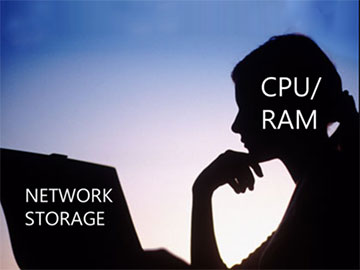The Extended Mind
In the meantime, we already have computers in our phones that are powerful to a degree that Alan Turing could only dream of. These computers may not be able to think like a human being, but they can certainly process information quickly and in some cases help us with decision-making. Their main relationship to human intelligence, however, is to extend our access to information. They don't think for us, but they give us information that we can think about and use. "Mind," however, is still something only humans (and perhaps some other animals) display.
Or can we be sure about that?
Marshall McLuhan had spoken of our media as "the extensions of man." Just as our other tools - an axe or a cane or a pair of glasses - extend the reach and the abilities of our bodies in the world, perhaps our communications systems extend our minds? In 1998 a pair of maverick philsophers, David Chalmers and Andy Clark, published a paper that caused a stir in the philosophical world. They proposed the validity of a concept they called "the extended mind."
The philosophical idea of the extended mind suggests that our computers and smartphones extend our minds as surely as if they were plugged into our cerebral cortexes - as, in the future, presumably they will be. Just as a paper notebook or a photo album extends our brain's memory (and these non-electronic tools are also examples of the extended mind, according to Chalmers and Clark), our hard drives and cloud storage extend the capacity of our minds. Humans have had extended minds since they invented writing, at least. For Chalmers and Clark, even a memo pad is an extension of our mind, an earlier "technology" we hit upon that has helped us to "remember" and think.
Chalmers and Clark suggest that technology may be able to do more for our minds than store information. To the extent that our machines can do "thinking" for us - for example solving math equations - they extend our minds' abilities in this regard as well. And some fans of the Extended Mind Theory have seen Google and the entire Internet (and now AI chat bots) as a further extension: as long as we are networked, our minds include the amassed knowledge of the entire online world. Here's a TedX talk where Chalmers asks you to think of your smartphone as part of your mind:
This way of talking about "mind" is of course an outrage to some people. Google and ChatGPT are not mind; only a human being can have a mind.
Traditionally in Western philosophy, there have been philosophical "dualists" who believe in the split between mind and body, while other people see mind as the brain (and thus part of the body). One often associates the "dualists" with religious and other "spiritual" views of humanity - for instance John Searle's attitude that consciousness is something more than a biological mechanical process. (Searle has been quoted as saying that "the extended mind" theory "makes him sick.")
Interestingly enough, though, it is not generally the philosophical "dualists" who have the most trouble with the extended mind. Philosophical "dualists" - remember - believe that there is more to the human "soul" than just the material human brain; like Searle, they believe that the mind is something separate from and not reducible to the "mechanical" functioning of the brain. Therefore, such people might be open to the idea of one's mind extending beyond one's physical body, because for them "mind" seems to be something more than another part of your body. So since the mind is neither "meat" brain nor electronic machine, but something more ethereal than that, some people who think like this can be open to the idea that the "mind" can leverage a computer just as it leverages the brain. The mind is something that uses the organic brain, so to speak, and it can use the mechanical technologies as well.
Meanwhile, it seems to be the hard-line "materialists" who can't accept the concept of technology as an extension of our selves. Because for them mind is reducible to physical mechanics - and "my mind" is the thinking organ (brain plus nervous system) of my body. "If it's not part of my meat, it's not part of my mind," they would probably insist. What do you think?

Some people might be willing to consider the interface of brain and digital knowledge as something that could legitimately be called "mind" in some broad sense, but just not "my" mind. More like mind (human consciousness) is a disembodied floating force in the world that uses me and my body, and can also use computers.
If I write down "milk" on a grocery list so that I don't forget to buy it, is that part of my mind? If my partner grabs the list on the way to the market, does it become part of their mind? Similarly, if my iPhone contains the phone numbers of everyone I know, even though I don't remember most of those numbers in my brain, does the phone become part of my mind when I use it? The question is debateable but intriguing.
As we become more reliant on technology for knowledge and as our tools become more intimately integrated into our bodies (from iPhones to wearables like Google Glasses to what most people assume will eventually be chip implants), does the definition of mind necessarily have to change in the way Chalmers and Clark have suggested? And how will that affect our sense of ourselves and our relationships to our minds, our machines, our bodies, and each other?